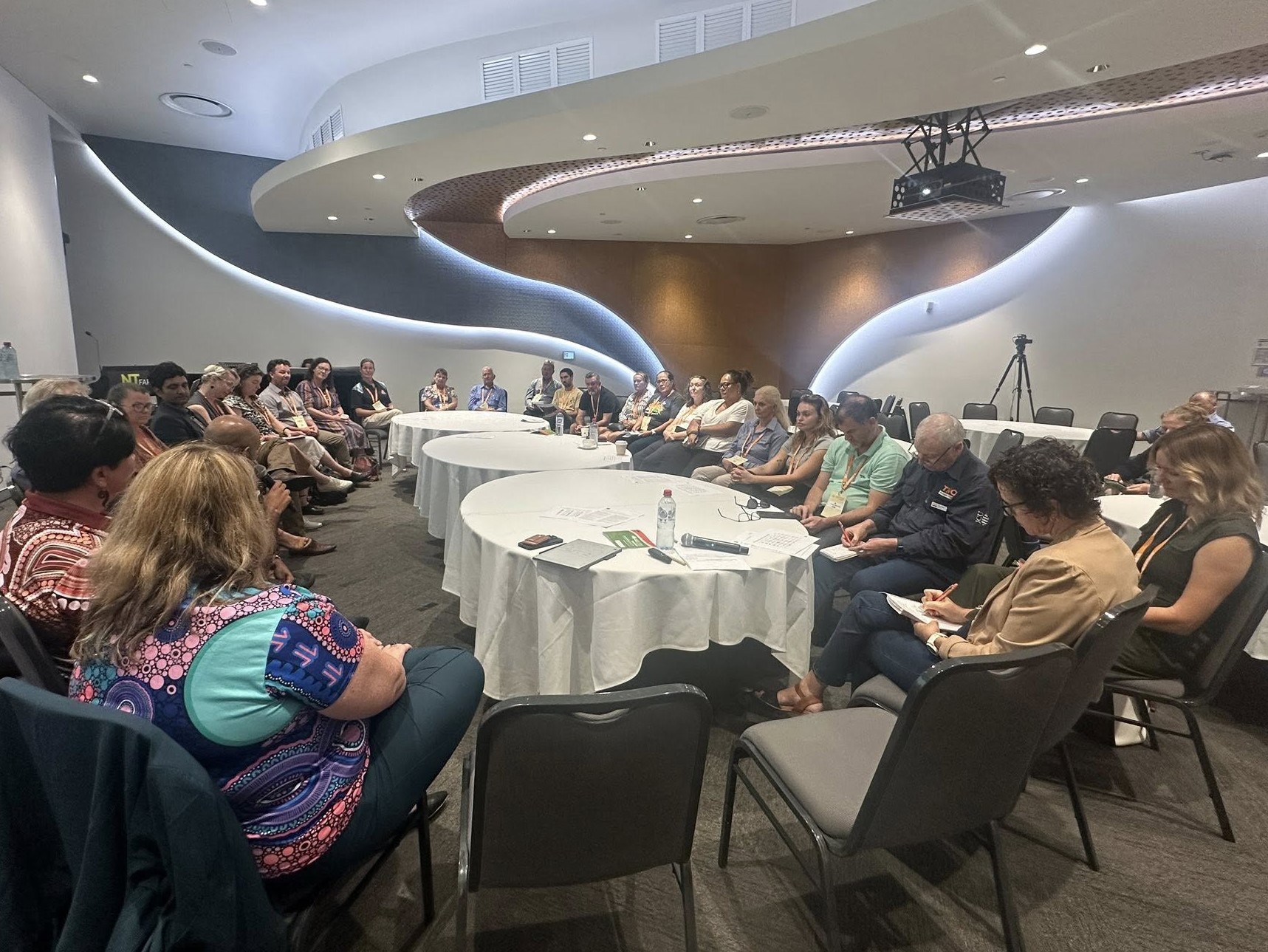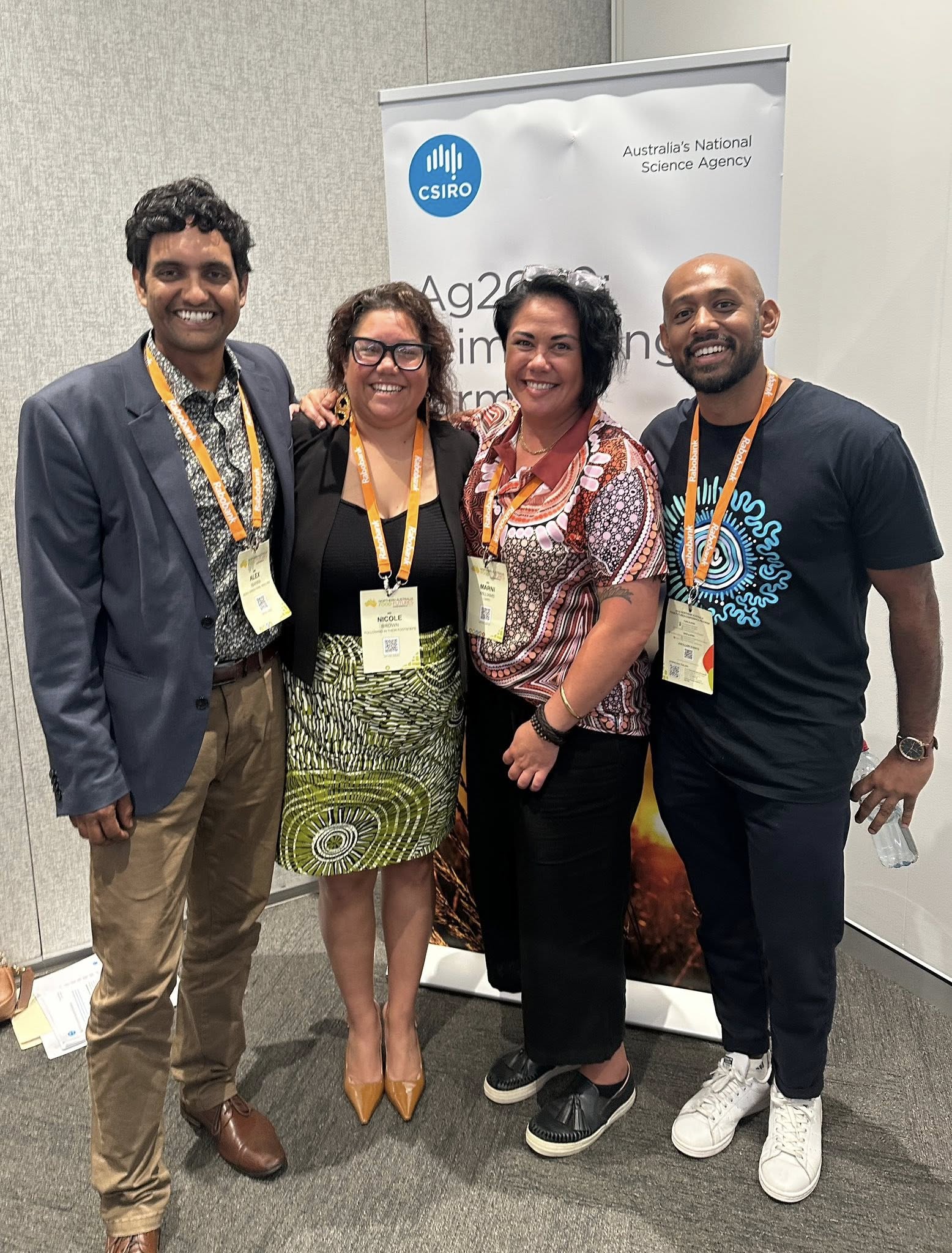Standing on the red dirt of my ancestral Larrakia Country, I was deeply humbled to facilitate the "Indigenous Yarn – Indigenous Farming Systems and Ag2050 Scenarios" panel at the 2025 Northern Australia Food Futures Forum (NAFF) last week.
I was invited by the incredible team at CSIRO to step into the shoes of an amazing leader whose legacy continues to guide many of us working across science, culture and Country. Throughout the session, I truly felt him next to me. In the way I held space, honoured voices, and shared stories, I hope I did him justice.
This Yarn was no ordinary panel — it was a collective reimagining of agriculture through an Indigenous lens, embedded in thousands of years of knowledge and guided by future-focused research. It was part of CSIRO's groundbreaking Ag2050 initiative — a collaborative foresight program that explores the challenges and possibilities for Australian agriculture by the year 2050.
Joining me in this powerful conversation were three changemakers: Alex Ibarra, Director of Indigi Green Farm and Indigi Bee; Dr. Rose Roche, Principal Research Scientist from CSIRO; and Zaynel Sushil, Experimental Scientist from CSIRO and passionate innovator shaping the future of science and community. Together, we explored questions that cut to the core of who we are as First Nations peoples and where we are heading.
We started by shifting the physical space — moving chairs, creating a place ensuring everyone had a seat at the table. It was more than symbolic. It embodied the values of equity, inclusion, and deep listening that underpin Indigenous ways of being. It reminded everyone in the room that this was not a panel to speak to the audience, but a space to yarn with them.

In our dialogue, we unpacked five critical themes that define what Indigenous agriculture could and should look like by 2050:
1. Protecting Indigenous Knowledge and Intellectual Property: Too often, traditional knowledge is co-opted without permission or benefit to communities. We spoke about the urgent need for Indigenous-led governance and policy frameworks that protect cultural knowledge while enabling innovation.
2. Cultural Land and Water Stewardship: Grounded in "Working with Country" principles, we reflected on the reciprocal relationship we have with our environment. Agriculture cannot thrive without respecting and protecting Country — its waterways, plants, animals and the spirits that connect them all.
3. Leadership and Equity in Agriculture: Aboriginal and Torres Strait Islander people currently make up only 1.8 per cent of the agricultural workforce. We challenged the audience to consider how we shift from participation to leadership — with more Indigenous-owned enterprises, research programs and policy roles.
4. Technology Powered by Tradition: The future of Indigenous agriculture is not about rejecting modern tools. It's about integrating them in ways that are guided by cultural protocols, seasonal rhythms and community values. The farmers of 2050 will be coding with one hand and reading Country with the other.
5. Addressing Consolidation and Ensuring Access: We acknowledged the risks in Ag2050's "Regional Ag Capitals" scenario — where centralised agribusiness could undermine access to land and food for remote and Indigenous communities. We pushed for models that prioritise decentralisation, local control, and cultural values.
Throughout the session, we shared stories — not statistics as a way to illuminate pathways forward. We grounded our yarn in lived experiences and asked the audience to listen deeply, not with the intent to reply, but to understand.
It was also a moment to call out that Indigenous futures in agriculture cannot be tokenistic. As outlined in the Ag2050 Scenarios Report, real change requires shifting the whole system — not just adding diversity but embedding Indigenous co-design, stewardship and sovereignty at every level of decision-making.

I'm incredibly grateful to Marni Williams, Research Project Manager from CSIRO whose grounding presence supported me through this process. Her quiet strength reminded me that holding space for others is a powerful act of leadership in itself.
The Yarn may be over, but the conversation continues. Whether it's through expanding culturally embedded programs like the Aboriginal Rural Training Program, scaling Indigenous carbon farming initiatives, or integrating Indigenous food sovereignty into national policy, we must keep these dialogues alive.
Because the future of farming isn't just about productivity. It's about justice. It's about land back. And it's about remembering that the oldest agricultural practices on this continent began with our people — and they still hold the answers we need.
We need to keep pushing forward, listening and building futures with Country, not just on it.
